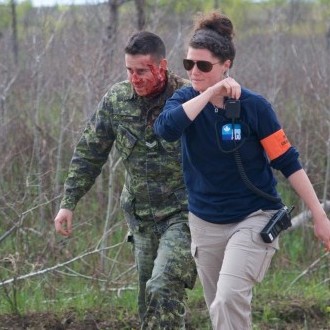 Motivating the team is one of those challenges for which leadership and management combine and overlap. Making sure your people feel that you are looking out for their welfare and taking an interest in their ambition and desire for development is certainly half the battle; the more difficult half but absolutely the more rewarding for the organisation is to then encourage them to take a real and active interest in shared aims and purpose.
Motivating the team is one of those challenges for which leadership and management combine and overlap. Making sure your people feel that you are looking out for their welfare and taking an interest in their ambition and desire for development is certainly half the battle; the more difficult half but absolutely the more rewarding for the organisation is to then encourage them to take a real and active interest in shared aims and purpose.
In previous articles, we’ve articulated the value of scenario based games and exercises in team building. Not only are they an excellent vehicle for leaders to get to see and hear their staff working together under a little pressure, they also provide an opportunity for newer or more specialist members of the team to have their voices heard and demonstrate some of the talent they have to offer. Leaders who take part in exercises can show that they are confident enough to ask for advice and to trust their team; coming across to the members of that team as a human, with human expectations, can also be very positive and encourage a culture of communication within the organisation. In an increasingly digital and screen-centred working world, the very analogue and human experience of playing a game or experiencing an immersive exercise together is a unique way to help people feel genuinely connected and included in a team.
Theorists talk about leadership styles on a scale running from transactional to transformational. At the transactional end of this spectrum, people are motivated by proverbial carrots and sticks; more money, a better pension, a shinier company car or a key to the executive washroom on the one hand and less money, less benefits, slower promotion or even dismissal on the other. At Evocatus, our view is that this sort of leadership is actually about management; the important work of setting the conditions in which people will feel looked after and treated fairly by the organisation and will thus be motivated to work hard in return. For the purposes of this article, though, we are far more interested in transformational leadership. This is the leadership of values and ideas; the leadership of people’s hearts as well as their minds and the leadership of shared hopes and dreams. It is the leadership by example that will motivate others to follow even when they are tired, stressed and uncertain. The language I’ve used here might seem surprisingly intense, but every one of these words applies in organisations where people come together for a common cause. Transformational leadership is not just about motivating people to work for you, it’s about inspiring them to work with you to achieve your goals; We can provide you and your team with shared experiences to help you achieve that.
One way of achieving this is including the team in strategy development and in decision making. By involving everyone in sessions designed to help everyone understand and see their part in the organisation’s strategy and to review and make decisions, we can help to build ownership. Not only can games help individuals really understand the organisation and its goals from the perspective of others but can also help them to understand the internal interactions and tensions between departments and stakeholders which are so important for effective business strategy development. South West or further afield, Evocatus is ideally placed to help design an experience that helps to motivate your team through a bespoke decision making exercise.
In times of change, when motivating employees to accept and embrace the need for change can be challenging, games can be used to build a compelling narrative to help build consent. Such consent-building exercises are a powerful way to show members of the team the situation from the perspective of other (or even all) stakeholders. These games are hugely rewarding for us to run, as we watch realisation dawn on the players that change really is needed. Seeing or hearing an argument might convince the mind, but to convince the heart and really inspire people, they need to experience an emotional challenge.
Exercises and games with a risk management focus work in a similar way. By running a crisis management exercise to address identified risks involving the whole team, everybody gets to experience the potential scenarios they might find themselves in and learn what part they may be expected to play in responding to a real incident. In the wake of such an exercise, people are far more aware of what risks the organisation might face and plans to deal with their impact. Although initially this might only motivate them to take more interest in supporting risk management efforts, it can also be part of awakening a broader interest in supporting the organisation.
Finally, games and exercises offer an opportunity for managers to practice leadership. Teams who see their leaders actively taking part in an exercise will follow their example; leaders who can publicly accept a little stress, listen patiently to their team, trust others to make their own decisions, face dilemmas and who are prepared to learn from mistakes can take big strides towards building a culture of transformational, inspirational leadership within their teams.
At Evocatus we offer motivational games across the South West, Oxfordshire, and London from our base near Bath. If your company is interested in motivational games for employees and you think we can help then please contact us.
